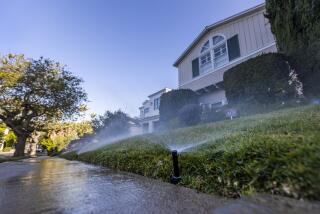Why Gamble With Our Water? : No One Downpour Will Help This Serious Liquidity Crisis
- Share via
Southern Californians could lick the drought of 1990 before it even takes hold with three simple steps: 1) Give up washing autos by hand. 2) Stop hosing off sidewalks. 3) Reduce lawn-watering by half. These actions could save as much as 200,000 acre-feet of water during June-September, according to the Metropolitan Water District of Southern California. That is the equivalent of the annual need of about 400,000 families--and roughly the size of Metropolitan’s projected water deficit this year.
The family auto might get a little dustier, but motorists still could go to carwashes that use recycled water. A broom or electric leaf-blower will clean the sidewalk just fine. The average lawn will fare every bit as well getting water only every other day.
There are many other ways to conserve. These suggestions do not even touch the inside of the home, where a little more than half the average family water use occurs.
The need for conservation became startlingly more apparent Tuesday. The Los Angeles Department of Water and Power announced that it would seek as much as 444,000 acre-feet of water from Metropolitan in 1990-91, primarily because of critically short supplies in the city’s Los Angeles Aqueduct system. The 444,000 acre-feet is nearly double the city’s current-year draw from Met and more than 10 times what the city took a decade ago.
Met, the wholesale agency for the six-county region, still is expected to have enough water to meet the demands of all 27 member districts--the area’s water retailers--but only by drawing down reservoir storage to about half of normal levels. To deplete the reservoir carry-over to that extent risks getting caught with a critical shortage in 1991 if next winter is another dry one. But the MWD could keep that water in reserve if residents would save the equivalent amount through conservation. Most cities already have programs in place that would save that much water--if everyone cooperated. But if real savings are to be achieved, it appears those programs will have to be made mandatory, with rigid enforcement and punishment, such as that proposed by Los Angeles Mayor Tom Bradley if voluntary measures do not cut usage by 10% in the next few weeks.
Now the choice is ours: at most, a little inconvenience this year, or the risk of real hardship down the road.
More to Read
Sign up for Essential California
The most important California stories and recommendations in your inbox every morning.
You may occasionally receive promotional content from the Los Angeles Times.













